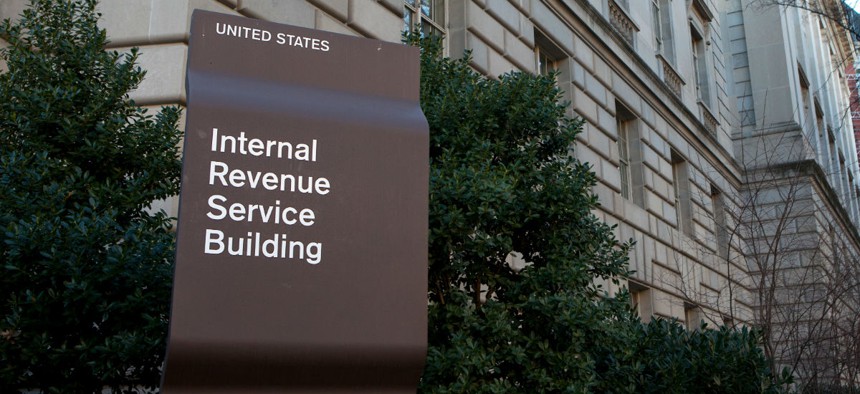
Mark Van Scyoc / Shutterstock.com
IRS Hires 1,000 Seasonal Employees, Plans to Downsize in Other Areas
Agency plans to use attrition to trim the number of agents and criminal investigators by 2,000.
The Internal Revenue Commissioner on Thursday credited Congress for a $290 million funding increase that will help reverse declining customer service by allowing him to hire 1,000 seasonal employees.
John Koskinen told reporters in a conference call Thursday that the Internal Revenue Service’s preparations are “on time” for the 2016 filing season, which begins on Jan. 19, even though a major tax extenders package didn’t clear Congress until Dec. 18. “The increased funding is an important development for the agency,” as the first budget hike in six years, he said, promising that IRS employees “stand ready” to handle the expected 150 million tax returns.
“But we must put it in perspective,” Koskinen said of the new funding. “It won’t solve our problems, even in the” targeted areas of telephone service, fraud detection and cybersecurity. “It will improve service but we’re still $900 million below where we were six years ago.”
He spoke just before release of a new Government Accountability Office report documenting the taxpayer frustration with customer service last spring.
The commissioner thanked the tax professionals and software makers who helped prepare for the season, which will end three days later this year—April 18—due to the District of Columbia’s Emancipation Day on April 15. (Taxpayers in Maine and Massachusetts have until Tuesday, April 19, because of Patriot’s Day observances on April 18.)
The IRS’s audit rate—one measure of its effectiveness in enforcement of tax law—is expected to drop a little given the “flat budget,” Koskinen said. He also mentioned plans to use attrition and not replace departing employees to trim the number of agents and criminal investigators by 2,000 to 3,000.
Koskinen highlighted the agency’s new partnership with private companies to curb identity theft, noting some new sign-on requirements on IRS.gov, which he encouraged taxpayers to consult before attempting to phone for help. He encouraged taxpayers filing income forms to qualify for insurance under the Affordable Care Act not to wait for a coming new form.
Despite past resistance to Congress’ just-enacted requirement that IRS farm out some debt collection to private agencies, Koskinen said the agency is “committed to making it work effectively.” The program, however, will not be up and running within the 90 says envisioned by lawmakers, he said, though he expects to have it designed and announced by then.
After warning of “persistent” telephone scammers who continue to “masquerade as IRS executives and representatives” to try and bilk victims of funds or personal information, Koskinen stressed that no IRS employee “makes angry calls for payments,” threatens to call police or asks for credit card numbers. He added that the agency communicates to delinquents by U.S. mail. He said the agency would send taxpayers being assigned to the private collectors a letter so they won’t be surprised.
Asked about a restriction in the fiscal 2016 omnibus spending bill barring IRS from issuing guidance to clarify what political activity is permitted by tax-exempt social welfare groups, Koskinen said he’d been talking to Congress and that the law doesn’t prevent his agency from updating its guidance over the long term. It will done to clarify how “fair” treatment of nonprofits is interpreted by different IRS employees. “We have no intention of influencing an election” by releasing new guidance this year, “but it’s not permanently off the table,” he said.
Queried on the recent rumblings among Republican lawmakers that they may try to impeach him, the commissioner said, “I’m aware of the impeachment” moves. He mentioned that “a small number of House members last summer sent a letter to president on firing me, and the president said he had no intention” of doing so. He cited reports from the Treasury Inspector General for Tax Administration, the Senate Finance Committee and the Justice Department that, he said, concluded that “no one in the agency was interfering with production of evidence” or that merited further action. “I’m comfortable here, and am prepared finish the last year of president’s term,” proud to be heading the IRS.
The GAO report released Thursday said IRS needed a new strategy and greater efficiency to improve customer service.
The IRS provided "the lowest level of telephone service during fiscal year 2015," with only 38 percent of callers able to reach an IRS representative, auditors found. Average wait times have tripled from 2010 to 2015, from 10.8 minutes to more than 30 minutes.
Koskinen told reporters the problems were “tied to the decrease in funds of $350 million” and that he had warned Congress in advance. The cuts also meant that last year’s seasonal workers were laid off a bit early at the end of tax season. “Last year’s level of service was so bad, almost anything would be better,” the commissioner said. “I hope the wait times [this year] will be only 20 minutes, though it ought to be one minute.”
Overall, “the taxpayer experience will be noticeably better,” he said, “but it still won’t be where we would like.”
In response to the GAO report, House Ways and Means Committee Chairman Kevin Brady, R-Texas, said the agency’s funding for customer service had been level. “Reaching an IRS employee often seems as unlikely as winning Powerball,” he said. “GAO has confirmed once again that few Americans are able to actually reach an employee and get the help they need. It is clear that the IRS needs to reexamine its priorities. Our committee will hold the IRS accountable as it begins the 2016 filing season.”







